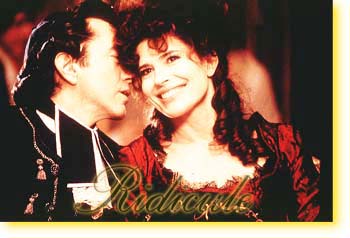Wit or Miss at Court
In One Era and Out the Other: Madame de Blayac (Fanny Ardant), an 18th-century schemer at the court of Louis XVI, listens to some poisonous royal gossip in Patrice Leconte's "Ridicule."
Snide wits talk themselves
By Richard von Busack
THE LEGENDARY French wit Voltaire was said only to smile, never to laugh; he is supposed to have commented, "I never make the 'ha-ha'." The snide courtiers in Patrice Leconte's Ridicule have adopted Voltaire's coolness without considering his humanity. These sniping, sophomoric wits at the court of Louis XVI have helped bring the government to a standstill by their childish seeking of rank and constant carving up of one another with their tongues.
Into this unpleasant setting comes Ponceludon (Charles Berling), an impoverished French lord from the marshes. He's at Versailles to petition the crown in favor of a drainage scheme that will chase away the mosquitoes and fevers of his land.
Ponceludon has the help of a friendly old duffer of a marquis named Bellegarde (Jean Rochefort) and Bellegarde's beautiful and intelligent daughter, Mathilde (Judith Godreche). Still, our hero is entombed by the intrigues, unable to gain the king's attention. Nurturing his native way with words, Ponceludon manages to hold a place at court until a new but unbereaved widow, Madame de Blayac (Fanny Ardant), takes an interest in him.
Screenwriter Remi Waterhouse introduces some shading in the plot by having not just Ponceludon compromised but also Mathilde, who is in the midst of negotiations to sell herself in a marriage for money to an elderly nobleman.
Leconte has a point to push home, the same point illustrated by the Biblical passage that was the moral of Krzysztof Kieslowski's Blue: "Though I speak with the tongues of men and of angels, and have not charity, I am become as sounding brass, or a tinkling cymbal." Despite this moral undercurrent, Ridicule is a light diversion, exemplified by Leconte's pleasing subplot about Mathilde's pioneering efforts to build a deep-sea diving suit.
Leconte is more interested in the astounding artifice and languor of the ancien régime than in the issue of the importance of being nice. For fans of the not-nice, the diabolical Madame de Blayac will be a treat.
Leconte, no doubt under the spell of Stephen Frears' version of Les Liaisons Dangereuses, introduces Ardant in the same way Frears introduced Glenn Close's calculating Marquise de Merteuil in Dangerous Liaisons--being powdered and prepared for her busy day of lounging, playing cards and talking trash about her fellow précieux.
The composition tells the difference. Frears cuts back and forth between Merteuil and her rival, Valmont, as they were readied for their battles of wits. Leconte shows Madame de Blayac nude, in a long shot, silhouetted as maids puff handfuls of talcum over her, until she's surrounded in a nimbus of dust.
Leconte makes the vice attractive while resolving the tale favorably. Dire events--suicide, humiliation, the threat of whoredom--occur, but the characters bounce back. Ridicule offers solace for those judged by the fashionable. It's a reminder that there's no disgrace in being sneered at by a chimp.
[ Metro | Metroactive Central | Archives ]
This page was designed and created by the Boulevards team.

Catherine Cabrol
into royal trouble
Ridicule (R), directed by Patrice Leconte, written by Remi Waterhouse, photographed by Thierry Arbogast and starring Charles Berling and Fanny Ardant.
From the Dec. 26, 1996 to Jan. 1, 1997 issue of Metro
Copyright © 1996 Metro Publishing, Inc.
![[Metroactive Movies]](/movies/gifs/movies468.gif)